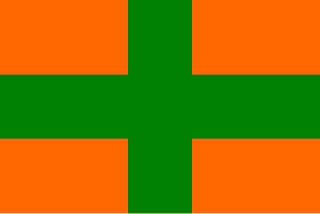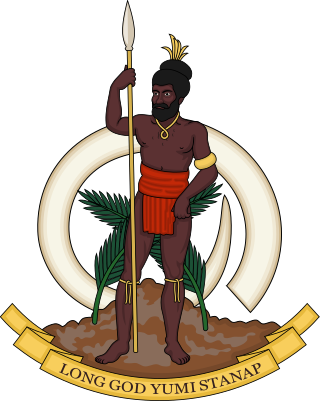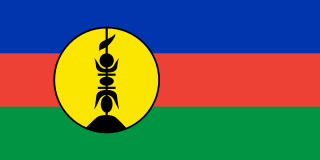 |
|---|
Legislative elections were held in New Caledonia on 6 October 1957. [1] The result was a victory for the Caledonian Union, which won 18 of the 30 seats.
 |
|---|
Legislative elections were held in New Caledonia on 6 October 1957. [1] The result was a victory for the Caledonian Union, which won 18 of the 30 seats.
Prior to the elections the 25-seat General Council was replaced by a 30-seat Territorial Assembly. The new body was elected by open list proportional representation. [2]
The elections were held under universal suffrage, with around 33,600 registered voters, [1] of which 18,964 were Kanaks and 13,406 Europeans. [3]
A total of 123 candidates contested the 30 seats, representing eight parties. [1] The campaign started on 16 September, [4] and was reported by Pacific Islands Monthly to have been "mild, with hardly an unkind word exchanged". [1]
Of the 30 elected members, 17 were Europeans and 13 Kanaks. [1]
| Party | Seats | |
|---|---|---|
| Caledonian Union | 18 | |
| National Centre of Social Republicans | 7 | |
| Lafleur Party | 3 | |
| Group of Caledonian Peasants | 1 | |
| Rally of Caledonian Workers | 1 | |
| Total | 30 | |
| Source: Pacific Islands Monthly | ||
An eight-member cabinet was elected by the Territorial Assembly in late October. All eight ministers were from the Caledonian Union. [5]

New Caledonia is a sui generis collectivity of overseas France in the southwest Pacific Ocean, south of Vanuatu, about 1,210 km (750 mi) east of Australia, and 17,000 km (11,000 mi) from Metropolitan France. The archipelago, part of the Melanesia subregion, includes the main island of Grande Terre, the Loyalty Islands, the Chesterfield Islands, the Belep archipelago, the Isle of Pines, and a few remote islets. The Chesterfield Islands are in the Coral Sea. French people, especially locals, call Grande Terre "Le Caillou".

New Caledonia is a French sui generis collectivity with a system of government based on parliamentarism and representative democracy. The President of the Government is the head of government, and there is a multi-party system, with Executive power being exercised by the government. Legislative power is vested in both the government and the Congress of New Caledonia. The judiciary is independent of the executive and the legislature.

The Caledonian Union is a pro-independence and the oldest political party in New Caledonia. In the latest legislative elections of May 10, 2009, the party won around 11.65% of the popular vote, and 9 out of 54 seats in the Territorial Congress.
Henri Lafleur was a New Caledonian politician. A member of the Senate of France from 1959 until 1974, he sat as an Independent Republican.
Éloi Machoro was a New Caledonian Kanak separatist politician.

General elections were held for the first time in the New Hebrides on 10 November 1975. The result was a victory for the New Hebrides National Party, which won 17 seats in the new Representative Assembly.

The Kanaks are the indigenous Melanesian inhabitants of New Caledonia, an overseas collectivity of France in the southwest Pacific. According to the 2019 census, the Kanaks make up 41.2% of New Caledonia's total population — corresponding to around 112,000 people.
Legislative elections were held in New Caledonia in January 1945. The first round of voting was held on 7 January and the second round on 24 January.
Legislative elections were held in New Caledonia on 8 February 1953.

General elections were held in Western Samoa on 15 November 1957.
Henri Bonneaud was a New Caledonian businessman and politician.
Legislative elections were held in New Caledonia on 7 December 1958. The result was a victory for the Caledonian Union, which won 18 of the 30 seats.
Legislative elections were held in New Caledonia on 15 April 1962. The result was a victory for the Caledonian Union, which retained its majority in the Assembly.
Legislative elections were held in New Caledonia on 9 July 1967. The result was a victory for the Caledonian Union, which won 22 of the 35 seats.
Legislative elections were held in New Caledonia on 10 September 1972. They had originally been scheduled for July, but were postponed by the French government. Anti-autonomist parties won 18 of the 35 seats, with the previously dominant Caledonian Union reduced from the 22 seats it won in 1967 to only 12.
Legislative elections were held in New Caledonia on 11 September 1977. Anti-autonomy parties won 19 of the 35 seats.
Early legislative elections were held in New Caledonia on 1 July 1979 after the Government Council was dismissed by the French government and the High Commissioner dissolved the Assembly elected in 1977.
Legislative elections were held in New Caledonia on 18 November 1984. They had originally been planned for July, but were postponed due to threats by the Independence Front to boycott and disrupt the vote. Most members of the Front subsequently merged into the Kanak and Socialist National Liberation Front in September, and proceeded to boycott the elections. As a result, the Rally for Caledonia in the Republic won 34 of the 42 seats in a landslide victory. Following the elections, Dick Ukeiwé became President of the Government.
Thomas Albert Hagen was a New Caledonian politician. He served in the General Council and Territorial Assembly from 1953 to 1967.
Early legislative elections were held in New Caledonia on 29 September 1985. They were called after the 1984 elections had been boycotted by the pro-independence Kanak and Socialist National Liberation Front (FLNKS) and were marred by violence that continued for several weeks after election day.